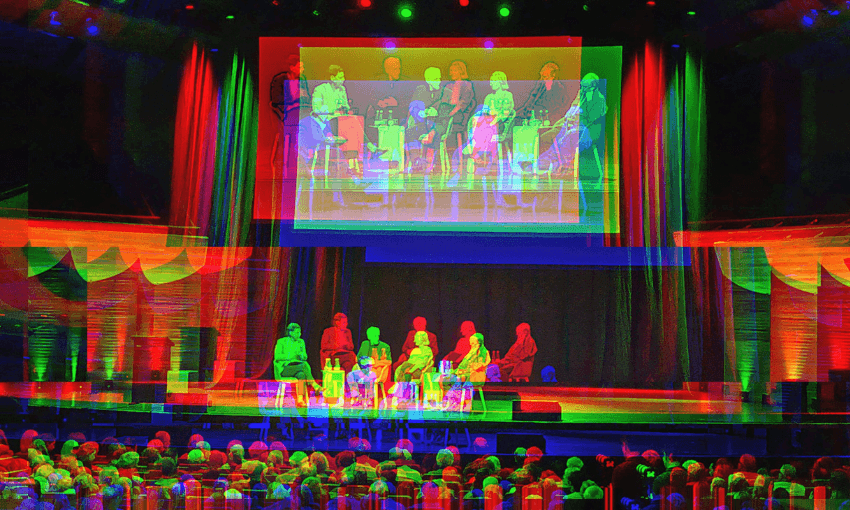The new political group’s first event drew a large crowd whose ideas for the city’s future mostly involved going back to the past.
Vision for Wellington, the political supergroup founded by some of Wellington’s wealthiest and most powerful people, held its first event at the Michael Fowler Centre on Wednesday night. It was hosted by journalist Patrick Gower and featured a panel made up of James Cameron (director of Avatar and Titanic), Emma Procter (research manager of PikPok gaming studio) and Stuart Niven (urban designer who worked for Wellington City Council in the 1980s and 90s).
The event drew a crowd of 1000, a genuinely impressive number for a two-hour panel discussion about local government. The production quality was slick, and Gower kept the questions quick and lively, but the talk was sorely lacking in substance.
For attendees who expected a right-wing political rally, it was disappointing. For those who wanted to hear fresh ideas about urban development, there was very little. And for those who came to see celebrity film director James Cameron, he turned out to be much less compelling on stage than behind the camera.
The most notable thing about the event was how old the crowd was. That’s not uncommon for local government events, but in this case it was overwhelming. The seats were filled with a sea of grey hair. During the Q+A session, an audience member asked everyone under 30 to raise their hands. I counted nine hands. He could have asked for people under 40 and wouldn’t have got many more. “I don’t think you’re a very representative group,” he told the panel. Two women behind me loudly complained about “the snowflake generation” and how “young people need to get off their arse”.
The age demographics were seemingly by design. The event was primarily advertised through the newspaper. There was no social media advertising. There wasn’t even a Facebook event. I only knew about the event because it’s my job to pay attention to this stuff – I didn’t encounter a single piece of organic promotion. For a group that says it wants to “co-create a vision” for the city, Vision for Wellington doesn’t seem particularly concerned about getting a diverse range of views.
As I left the event, my main reaction was confusion. What was the point of this? What do they actually want? From a close analysis of the panel discussion and the reactions of the crowd, this is the vision that Vision for Wellington seems to be pushing:
Vision #1: Make it the 90s again
The event was titled “What makes a world-class city, and how does Wellington become one?” but there was no mention of public transport, pedestrian areas, green spaces, water services or rates. Housing affordability didn’t come up at all until an audience question from Green MP Julie Anne Genter and another from a Victoria University student. This was apparently an obscure issue that none of the panelists had prepared for. “It’s a complex problem. I wish I had a solution,” Procter said. “I’m not a city planner, I don’t know what the answers are,” Cameron said, before suggesting that more apprenticeships might help.
Niven, who submitted on the Wellington District Plan opposing higher height limits in Khandallah and the centre city, said it was impossible for the private market to address housing affordability. “The only provider of that is the public market,” he said, to applause from the audience. His position on affordable housing was popular in the 20th century but has fallen deeply out of favour among modern city planners and housing academics, who see housing as a supply-and-demand problem that can be solved by building more.
Niven spoke at length about how council consultation was better in the 90s when he was in charge. He described some of the innovative things he did during the Wellington waterfront redesign: multiple rounds of design consultation, showing people before-and-after pictures, and taking groups on walking tours. He was making an implicit attack on the council processes around the Golden Mile but failed to mention that the council still does literally all of those things.
The biggest applause line of the night was when Cameron said he didn’t like the bike lane on Kent Terrace. Later, when reminded by a questioner that he is an environmentalist, Cameron partially backtracked. “I threw that out there earlier because I knew it would be meat in front of a junkyard dog because we’re all feeling the pain of that.” He said he supported walking and cycling and told the audience to eat less meat and dairy. Niven offered a reasoned response about the importance of a fully connected cycle network to drive behaviour change, but the crowd wasn’t as interested.
A close second for the loudest applause moment was in response to an audience member from Tītahi Bay who complained about how difficult it was to park their car in the city. Cameron agreed, “It’s a nightmare”. “Yeah, it’s a nightmare and it’s hard,” Gower added. “It’s unwelcoming if you’re coming by automobile,” said Cameron, who himself is fond of commuting by helicopter. He suggested Wellington could solve the problem by building high-rise parking buildings – which already exist.
Vision #2: Business subsidies maybe?
The closest the panel came to proposing new ideas for the city was a high-level discussion about incentives for the creative and tech sectors. Cameron wanted Wellington to support the film industry more and suggested more government subsidies might help. He wanted universities to teach more courses in film.
Procter wanted the same but for gaming, and cited the previous Labour government’s tax rebate for game developers as a good example. She had to explain to the crowd that gaming wasn’t just for teenage boys in their parents’ basement, it also included phone games like Wordle. There was an audible reaction of surprise when she told them the gaming industry was worth more to New Zealand exports than wool. Procter offered the only specific policy suggestion of the evening when she cited the city of Helsinki’s startup grant as an example of something Wellington could replicate – a worthy idea that deserves more exploration.
Roger Bradshaw, a former city councillor from the 90s, offered a suggestion from the audience: “Wellington used to have the Wellington Regional Economic Development Agency and we should be able to do that again,” he said. The crowd applauded the question, and the panelists vaguely agreed it would be a good idea. Bradshaw and the panelists all seemed unaware that the Wellington Regional Economic Development Agency very much still exists – it has rebranded as WellingtonNZ.
Vision #3: Young people should respect their elders
The big theme of the night was respect. It came up over and over again. Niven wanted a council that “treats people with respect”. Cameron wanted “listening and respect” and said, “You earn respect by being respectful of others”. Procter said “listening to people” was key. The crowd applauded every time. Though no one said it explicitly, the underlying message appeared to be: “respect your elders“.
There is a very real sense of frustration among the older generation of Wellingtonians that the current council isn’t listening to them. And to a large extent, it’s true. The council isn’t listening to them as much as they used to, because councillors have figured out the demographic of people who make endless submissions resisting changes in their neighbourhoods aren’t necessarily reflective of the wider electorate. That can be frustrating for submitters who feel their voices are ignored – but it’s just as frustrating for the council staff, who constantly find themselves at loggerheads with submitters who oppose virtually everything.
The other driver of frustration is simply that times are changing. The leading thinkers in urbanism are pushing new ideas that conflict with the philosophies of most of those in the room. Council staff in Wellington (and in most major cities around the world) are interested in modern urban design that supports high-density housing, low-carbon living and walkable streets, rather than the car-based suburbia that was popular in the 20th century. To some of the people who grew up in the Wellington of the past, that change might be scary and confusing. They might not understand why walkable and bikeable cities appeal to the younger generation – just as the younger generation often don’t understand why their elders are so triggered by the idea of a bike lane.
I’ve previously described Wellington local politics as being split into two blocs: The younger, forward-thinking New City, and the older, traditionalist Old Town. The members of Vision for Wellington are The Avengers of the Old Town uniting for one last go at influence.
The New City has had a series of big wins under Tory Whanau’s mayoralty: the high-density District Plan, the rapid rollout of cycle lanes, and the Golden Mile project which is due to begin in April. To the Old Town though, those changes are seen as a destruction of their way of life. It has generated an intense backlash.
This event showed that the Old Town is well-organised, well-funded and extremely motivated to topple Tory Whanau. In the final moment of the night, Niven urged people to “stay angry and demand change”. A voice from the crowd called out “Get rid of the mayor!” The room erupted in cheers.


